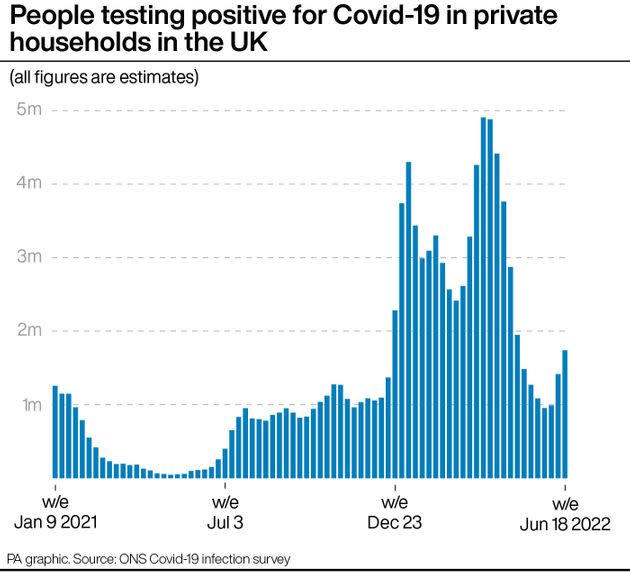How Worried Should We Be About Covid Spikes This Summer?

(Photo: Andrew Holt via Getty Images)
Covid cases have jumped up yet again in all four UK nations.
With mass events such as Glastonbury still going ahead and more transmissible variants circulating, fear over high infection rates is rising once again.
According to the Office for National Statistics’ latest estimates, around 1.7 million people had Covid last week. This is a 23% jump from the 1.4 million cases the week before – a particularly surprising stat, considering rates usually decrease in the summer months as people spend more time outdoors.
So just how worried should we be?
What’s behind the current Covid wave?
The current spike in cases has been linked to two Omicron sub-variants, BA.4 and BA.5, which have become the dominant strains in the UK.
They are both more infectious than the previous Omicron variant, and their prevalence shows how Covid is still adapting and evolving.
Immunologist at Founding Scientist at Cignpost Diagnostics, Denis Kinane, told HuffPost UK: “The two strains have been shown to overcome immunity developed for other strains of the virus as evidenced by the rising numbers of reinfections.”
Crucially, he pointed out that the transmission of BA.4 and BA.5 was likely aided by socialising during the Platinum Jubilee bank holiday.

People testing positive for Covid-19 in private households in the UK (Photo: Press Association Images)
Mass events will cause a spike
We knew this – increased socialising in confined spaces without face masks has been known as a root cause of Covid infection rates since the first lockdown began.
“Mass events are highly likely to fuel an increase in the spread of Covid, driven by social mixing, coupled with waning levels of immunity,” Professor Kinane said.
He warned Glastonbury will not be any different.
The UK’s largest festival has around 200,000 attendees, meaning it is likely to trigger “reinfections and first-time infections”.
However, the expert pointed out: “Without free tests, people are less likely to be diagnosed.”
This makes it harder to track infection levels, and understand the spread of the virus around the country.
But there is an important caveat – vaccines
Our World in Data claims 74.5% of the UK population have received at least one dose of the Covid vaccine.
While this does not mean transmission rates will necessarily slow, it should prevent most people from developing severe infections and reduce hospitalisations.
As Professor Kinane added: “The wide uptake of the booster vaccination programme and discussions around the offer of a further jab in the Autumn should put the country in a better place than in the past two years.”
It should be noted that the number of hospital patients in England with Covid has started to increase again recently.
The European Centre for Disease Prevention and Control predicted the current wave back in May.
The experts explained: “Based on the limited data currently available, no significant increase in infection severity compared to the circulating lineages BA.1 and BA.2 is expected.
“However, as in previous waves, if Covid case numbers increase substantially, some level of increased hospital and ICU admissions is likely to follow.”

Hospital patients in England with Covid-19 (Photo: PA GraphicsPress Association Images)
“We are seeing Covid cases across the UK rising very fast,” Professor Tim Spector, lead scientist on the Zoe Health Study, agreed in his latest video.
“This means around 1 in 27 people out there currently have Covid which is the highest we’ve seen for a very long time and the number goes even higher if you’re living in Scotland, where it’s 1 in 18 people.”
He added: “We are seeing hospitalisation going up for the first time in a long time.” However, he stressed that so far there has been no increase in deaths, which are “still pretty low for this time of year” – and down week on week.
What about the future?
Professor Kinane said it is “inevitable that new strains will emerge” which could be more resistant to current vaccines.
He added: “I am most concerned that with one in 50 of the population currently infected with the virus, an Autumn surge in case numbers, as happened in each of the past two years.”
He urged immuno-compromised people to also take particular care during periods of increased infections and try to reduce their social contact.
But, Britain is more prepared than in the past.
“The UK’s population is also better equipped immunologically to counter Covid and it is crucial that if a further vaccination dose is offered, take-up should be swift and across the board as seen during the booster programme at the end of 2021.”
He also pointed out that the UK needs a “baseline level of surveillance” to track Covid’s behaviour and track new variants, although without free testing and a reduction in border control measures, this is significantly harder.
This article originally appeared on HuffPost UK and has been updated.

 Yahoo Movies
Yahoo Movies 
